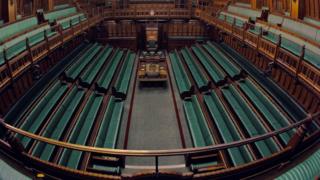
A group of women's charities and unions are calling on Parliament to step in and suspend a Conservative MP after he was arrested over rape allegations.
The unnamed man in his 50s was arrested on Saturday and later released on bail.
The former minister has not been suspended by the Tories, with the party saying it was right for the police to investigate the claims.
In a joint statement, the groups said it showed "party politics was still interfering in justice and fairness".
A Tory Party spokeswoman said: "We take any complaint incredibly seriously."
A spokesman from the House of Commons said they could not comment on specific cases, but said "sexual harassment has no place" in Parliament, adding: "We take the safety of our staff seriously and are ensuring that any necessary measures are taken in respect of our employees."
For an MP to be suspended by Parliament, a complaint needs to be considered by the House's Commissioner for Standards and an independent expert panel.
If the complaint is considered to be serious enough for suspension or expulsion, the panel will make the recommendation to the Commons and MPs will vote on it.
However, Parliament is on recess until 1 September, and votes can only take place when it is sitting.
'Minimising violence'
The statement calling for action was issued by the TUC, Centenary Action Group, the Fawcett Society, Women's Aid and unions representing parliamentary staff (Unite, Prospect, PCS and FDA).
It accused the government of "minimising violence against women and girls" by allowing the MP to keep the Conservative whip, saying there was a "failure to believe victims and survivors when they bravely speak out".
The statement added: "Given the seriousness of the allegations, we're calling on Parliament to suspend the MP arrested on suspicion of rape, pending a full investigation.
"The House of Commons should be no different from any other workplace. Safety and the safeguarding of staff must be paramount."
As well as calling for parliamentary intervention, the groups urged the Conservatives to remove the whip - meaning he would no longer be able to sit as a Tory MP.
They also said all political parties should revise their own internal sexual harassment and complaint policies "to ensure that they are transparent, quick, victim-focused and independent".
What stops the media from naming rape suspects?
The police usually do not name suspects before charging them and there are two powerful parts of the law which deter the media from naming them.
Firstly, an alleged victim has automatic right under statute to lifelong anonymity. That right can only be waived in writing by the victim.
The media must therefore be careful not to add to a "jigsaw" identification and so must limit publishing any details which could help identify an alleged victim.
There are also strong privacy reasons for not naming. Cliff Richard's 2018 legal action against the BBC (and later cases) established that individuals under investigation by the state have a reasonable expectation of privacy in relation to the fact of an investigation and its details up until they are charged.
That can be displaced but only if there are sufficient public interest grounds to name the suspect. It is a balancing act which different parts of the media, advised by their different lawyers, view differently.
Which is why some parts of the media may decide to name more quickly than others.
The Conservatives' Chief Whip, Mark Spencer, defended the party's decision not to withdraw the whip on Monday, saying it "didn't want to do anything to identify the victim".
Speaking to reporters, he said the allegations were "very serious" and it was up to the police to investigate them.
"Once they've come to their conclusion, then we can assess where we're at and the position that the MP finds himself in," he said.

Media playback is unsupported on your device
The Sunday Times, which first reported the story, said the complainant alleged the MP assaulted her, forced her to have sex and left her so traumatised that she had to go to hospital.
The newspapers said the allegations had been made by an ex-parliamentary employee.
The Metropolitan Police said it had launched an investigation into the allegations.
"On Friday, 31 July, the Metropolitan Police Service received allegations relating to four separate incidents involving allegations of sexual offences and assault," the force said in a statement.
"These offences are alleged to have occurred at addresses in Westminster, Lambeth and Hackney between July 2019 and January 2020."
Police said the man has been released on bail to return on a date in mid-August.
'Code of conduct'
It is understood that Mr Spencer spoke with the complainant in April, but he insists that she did not make any allegation of serious sexual assault.
According to sources, Mr Spencer had not known the "magnitude" of the allegations.
But a report in the Daily Telegraph suggested the woman became frustrated after they spoke that nothing was done.
It is also understood the Leader of the House of Commons, Jacob Rees-Mogg, was told by an MP in recent weeks about the claims - with sources saying he had said the woman should contact the police.
A Tory party spokeswoman said: "We have a code of conduct where people can report complaints in confidence.
"If a serious allegation is raised, we would immediately advise the individual to contact the police."
In 2016, the Commons approved changes to its procedures to end the practice of MPs being automatically identified by the Speaker if they were arrested.
Under the rules in force since then, the MP involved will be consulted and named in Parliament only if there is an issue of "parliamentary privilege or constitutional significance" at stake.

 5 years ago
619
5 years ago
619 

